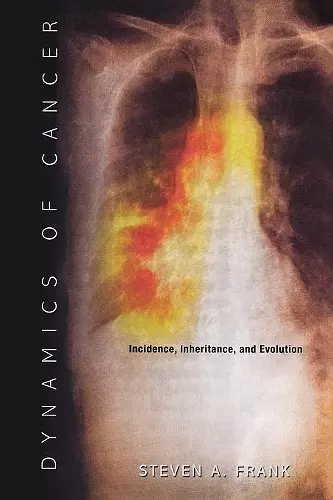Dynamics of Cancer
Incidence, Inheritance, and Evolution
Format:Paperback
Publisher:Princeton University Press
Published:20th Jul '07
Currently unavailable, and unfortunately no date known when it will be back

As Frank observes, 'Cancer is the failure of controls over cellular birth and death.' Although a vast amount of work has gone into describing the molecular and cellular processes involved, an understanding of the overall dynamics of these processes is less advanced. This book combines empirical information with insights into the nonlinear dynamics of multistage progression, in ways that both illuminate and have practical implications. Anyone with serious interests in cancer research should read it. -- Robert M. May, University of Oxford This is an excellent book on a very difficult but important subject. It does a superb job of introducing the various models for observed cancer frequencies and explaining their assumptions, conclusions, and weaknesses. -- Darryl Shibata, University of Southern California This is a book of relentless scholarship, precise organization, and fundamental, interdisciplinary insights into the biology of cancer. It provides the first truly comprehensive theory for the epidemiological/genetic incidence curves that characterize cancer, the first solid integration of evolutionary genetics with cancer biology, and a rigorous, well-reasoned approach to progress in understanding the genetic and environmental bases of cancer. -- Bernard Crespi, Simon Fraser University
Provides a conceptual and historical framework for understanding the causes of cancer and other diseases that increase with age. This book interprets various observations on the age of cancer onset, the genetic and environmental causes of disease, and the organization of tissues with regard to stem cell biology and somatic mutation.The onset of cancer presents one of the most fundamental problems in modern biology. In Dynamics of Cancer, Steven Frank produces the first comprehensive analysis of how particular genetic and environmental causes influence the age of onset. The book provides a unique conceptual and historical framework for understanding the causes of cancer and other diseases that increase with age. Using a novel quantitative framework of reliability and multistage breakdown, Frank unifies molecular, demographic, and evolutionary levels of analysis. He interprets a wide variety of observations on the age of cancer onset, the genetic and environmental causes of disease, and the organization of tissues with regard to stem cell biology and somatic mutation. Frank uses new quantitative methods to tackle some of the classic problems in cancer biology and aging: how the rate of increase in the incidence of lung cancer declines after individuals quit smoking, the distinction between the dosage of a chemical carcinogen and the time of exposure, and the role of inherited genetic variation in familial patterns of cancer. This is the only book that presents a full analysis of the age of cancer onset. It is a superb teaching tool and a rich source of ideas for new and experienced researchers. For cancer biologists, population geneticists, evolutionary biologists, and demographers interested in aging, this book provides new insight into disease progression, the inheritance of predisposition to disease, and the evolutionary processes that have shaped organismal design.
"Frank is an evolutionary biologist with a strong mathematics bent. His book grapples with many...issues, offering insights from his mathematical modelling of various steps of tumour progression...One day he may be seen as the pioneer who began the difficult task of building a sturdy foundation for a truly useful mathematical model of cancer development."--Robert A. Weinberg, Nature "Frank's forte in the book is his search for the simplicity that is often masked by the complexities of cancer. With his mathematical models in hand, he turns to the details of cancer genetics, carcinogens, and aging and provides novel integrative insights...Dynamics of Cancer emphasizes both the multiscale dynamics of the disease and an approach that synthesizes empirical knowledge with parsimonious, mathematical theory. Frank moves the field forward, narrowing the gap between a tragic disease of everyday life and the Darwinian world of the genome."--David C. Krakauer, Science "This book is a superb teaching tool and a rich source of ideas for new and experienced researchers. For cancer biologists, population geneticists, evolutionary biologists, and demographers interested in aging, this book provides new insight into disease progression and the inheritance of predisposition to disease."--Biology Digest "It will be highly interesting to a wide readership, including students who would like to learn about this subject, theoretical/mathematical biologists, epidemiologists, and molecular/clinical cancer biologists. Although the volume is based on mathematical theory, the excellent writing style ensures that it can be read both by biologists with no background in mathematics, and by theoreticians who would like to learn more about the dynamics that govern cancer initiation and progression."--Dominik Wodarz, Quarterly Review of Biology
ISBN: 9780691133669
Dimensions: unknown
Weight: 539g
400 pages